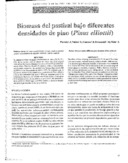Biomasa del pastizal bajo diferentes densidades de pino (Pinus elliottii)
ISSN
1022-7482Fecha de publicación
2002Tipo
Artículo
Metadatos
Mostrar el registro completo del ítemTítulo alternativo
Pasture biomass under different pino densities (Pinus elliottii)
Descripción
4 ilus. 2 tab. 10 ref. 5 pág.
Resumen
Se estudió el efecto de cuatro intensidades de raleo (25, 37, 50 y 62 por ciento de los árboles más un testigo sin ralear densidad original 1600 árboles ha-1) sobre biomasa herbácea invernal bajo plantaciones de Pinus elliottii de 18 años de edad en la Sierra Comechingones, Córdoba, Argentina. Se encontró una biomasa herbácea = 180 kg MS ha-1 con intensidades de raleo = 50 por ciento. Se concluyó que: 1) cuando se reduce el área basal de la plantación de Pinus elliotti a = 38 m2 ha-1 (intensidad de raleo = 50 por ciento), se regenera parte de la composición florística del pastizal natural que existía al momento de la reforestación y 2) los niveles de producción del pastizal natural permiten afirmar que es posible establecer sistemas integrados para la producción de forraje y madera. The effect of four thinning intensities (25, 37, 50 and 62 percent of the trees and a control without thinning original density 1600 trees ha-1), on underlying herbaceous biomass in the winter, was evaluated in an 18 year old Pinus elliottii plantation in the mountain range of Comechingones, Cordoba, Argentina. With a thinning intensity = 50 percent, herbaceous biomass was = 180 kg MS ha-1. It was concluded that: 1) when the Pinus elliotti basal area is reduced to = 38 m2 ha-1 (thinning intensity = 50 percent), part of the floristic composition of the natural pasture, which existed at the time of reforestation, regenerated and 2) the production levels of natural grassland do make it possible to establish integrated systems for the production of forage and wood.
Palabras clave
Editor
CATIE, Turrialba (Costa Rica)


